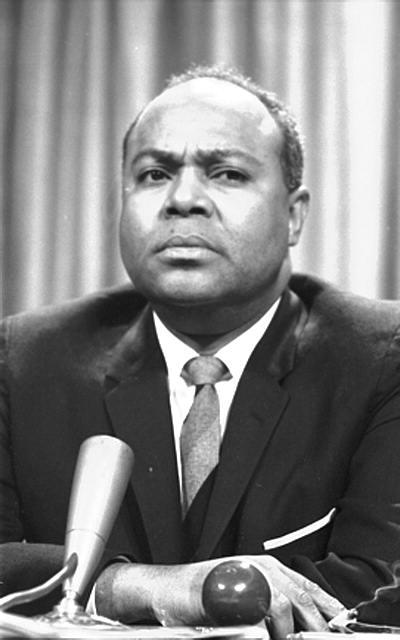James Farmer (1920-1999)
James Farmer, one of the founders of Congress of Racial Equality, at a meeting of the American Society of Newspaper Editors in 1964.
Farmer was born in 1920 in Marshall, Texas. At a young age Farmer was exposed to intellectual conversations, and a multitude of books, since his father was a college professor. In 1938, he attended Howard University's School of Religion. There he learned about the philosophy of Mohandas Ghandi. Farmer followed Ghandi's strategy of non-violence to obtain civil rights. In the 1940s, Farmer became a programer of the National Association of the Advancement of Colored People. The following decade he founded the Congress of Racial Equality (CORE) with George Houser, James R. Robinson, Samuel E. Riley, Bernice Fisher, Homer Jack, and Joe Guinn. Most famously, Farmer and his CORE members created and organized the Freedom Rides of 1961.
For more on James Farmer go to:
http://www.core-online.org/History/james_farmer_bio.htm
https://www.jfklibrary.org/learn/education/students/leaders-in-the-strug...

Trikosko, Marion S. [James at a meeting of American Society of Newspaper Editors, bust portrait, seated at a table before a microphone]/ [MST]. 1964. Film negatives. Library of Congress: Prints and Photographs Division. https://www.loc.gov/item/2003688125/ (Accessed December 5, 2018)
Public Domain
Public Domain is a copyright term that is often used when talking about copyright for creative works. Under U.S. copyright law, individual items that are in the public domain are items that are no longer protected by copyright law. This means that you do not need to request permission to re-use, re-publish or even change a copy of the item. Items enter the public domain under U.S. copyright law for a number of reasons: the original copyright may have expired; the item was created by the U.S. Federal Government or other governmental entity that views the things it creates as in the public domain; the work was never protected by copyright for some other reason related to how it was produced (for example, it was a speech that wasn't written down or recorded); or the work doesn't have enough originality to make it eligible for copyright protection.
Add a comment
PLEASE NOTE: NCpedia provides the comments feature as a way for viewers to engage with the resources. Comments are not published until reviewed by NCpedia editors at the State Library of NC, and the editors reserve the right to not publish any comment submitted that is considered inappropriate for this resource. NCpedia will not publish personal contact information in comments, questions, or responses. If you would like a reply by email, note that some email servers, such as public school accounts, are blocked from accepting messages from outside email servers or domains. If you prefer not to leave an email address, check back at your NCpedia comment for a reply. Please allow one business day for replies from NCpedia. Complete guidelines are available at https://ncpedia.org/about.